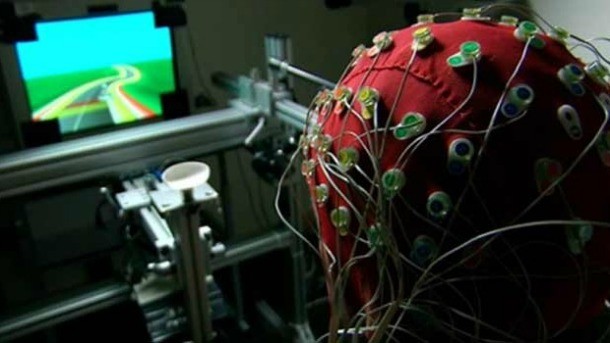This Neuroscientist Wants To Use Video Games Like Medicine

Games may have their roots in entertainment, but the technology powering the $90 billion industry has the capacity to make in impact outside of fun and artistic value. Dr. Adam Gazzaley is harnessing the concept of "neuroplasticity" (the brain's ability change in response to behavior, environment, and a number of other stimuli) in concert with video games to promote positive brain performance.
During a presentation at Singularity University’s Exponential Medicine convention, Gazzaley, a gamer and neuroscientist from the University of California San Francisco, outlined his ideas for utilizing specially-designed games in neurological medicine. Dr. Gazzaley has been working with members of the LucasArts team to develop video games that can measure and track their effects on the brain.
The games are simplistic and feature various prompts that are designed to promote synaptic response from different areas of the player’s brain. One of those games, NeuroRacer, is a plain driving game where players have to shoot down signs of different colors at different intervals.
When measuring the results of repeated play of NeuroRacer, Gazzaley and his team tracked marked improvements in memory and attention span and other cognitive functions, both in younger and older players.

NeuroRacer isn’t the only game in Gazzaley’s project. Others link physical and cognitive fitness, rhythm, attention, and meditation to study, measure, and describe the prophylactic effects of video games on the human brain.
Another one of Gazzaley’s projects, entitled GlassBrain (watch the video below), utilizes MRI (magnetic resonance imaging), DTI (diffusion tensor imaging), and the Unity3D engine to create a real-time model of an individual’s brain. When using the hardware and software, users can watch their brain work in real time.
Gazzaley hopes to continue development on his games by making them more interesting and compelling, including realistic environments, difficulty levels, and in-game avatars for user engagement. It’s with these tools and interest that Gazzaley is trying to figure out if games can be a tool for extending human brain life.
[Source: Singularity Hub]
Our Take
Dr. Gazzaley's work is the yang to a common yin: since their infancy, games have gotten a bad rap as instruments of violence, so it's really good to see a medical professional – who has first-hand knowledge of games – working on a project that combats that notion. Hopefully, Gazzaley's work can change the conversation about the effects of video games on human brain development. Neuroracer won't win any game of the year awards, but the whole project goes to prove that the medium isn't always the message (sorry, Marshall McLuhan).

Get the Game Informer Print Edition!
Explore your favorite games in premium print format, delivered to your door.
- 10 issues per year
- Only $4.80 per issue
- Full digital magazine archive access
- Since 1991






